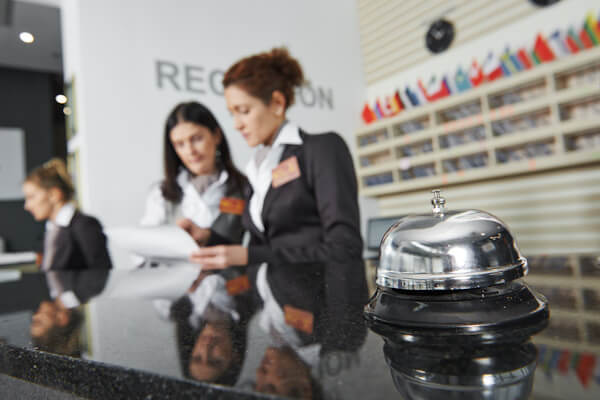How to Adopt Express Check-in at Your Hotel
Express check-in (also known as mobile check in or contactless check in) enables guests to check themselves into rooms, without having to visit the front desk. Guests often access this through their mobile phones.
Traditional check ins usually result in multiple contact points with the hotel staff throughout the check in and check out process. This can be a time consuming process for guests, causing it to be less than appealing.
Add to this, guests now actively seek to maintain social distancing in hotel lobbies or at the front desk. In the pandemic or the post-pandemic recovery situation, frequently, guests opt for express check in solutions at hotels to avoid crowds.
Why is express check in important?
Express check in is not a new concept.
Even before the COVID-19 pandemic hit, the traditional check in process was already tedious.
Guests would arrive at the hotel and visit the front desk. After waiting in line, guests verified their information and handed over an ID to hotel staff. At times, they would need to fill out forms or answer questionnaires, which the hotel front desk staff would record into their hotel booking and CRM systems.
Regardless of whether guests are at hotels for leisure or while traveling for work, no one wants to spend the first 15 minutes on property standing in line. Hotels know this and were working to change this even before the pandemic.
Contactless, or express, check in uses technology to minimize these contact points. Leveraging these technologies at various checkpoints allows hotel managers to streamline the check in process. And Ivy has got you covered with a speedy digital concierge and room ready notifications.
The pandemic impact on contactless travel
The COVID-19 global pandemic has hit every sector across the globe. Eighteen and more months after the start of the pandemic we are still seeing restrictions on air travel and health organization directives for people to avoid travel and stay home impacting the hotel industry. Research from McKinsey this year suggests that recovery of the hospitality industry to pre-COVID-19 levels may take until 2023.
Hotels in some states in the US have already reached their pre-pandemic occupancies. Surveys show that even in these states travelers are actively seeking security in the form of contactless check in and touch-less journeys. Guests say that they feel more comfortable staying in a hotel that offers digital room keys (26%) and contactless payment options (35%).
In hotels with low occupancy rates and with limited staffing, hoteliers are looking at ways in which technology can help enable express check in for guests.
What express check in means to hotel guests
Enabling guests to check themselves in makes them feel safer while speeding up their check in process.
Research indicates that many guests in the US are anxious after 3 minutes of waiting time at check in. With an express check in, guests can bypass the wait at hotel receptions easily and get started on their vacation or work without delay.
What express check in means to hotel owners
Offering guests the option of an express check in also reduces the workload on front desk reception staff.
By eliminating the need to manually check in and check out every guest, staff can focus on other value-added tasks as well as critical issues. The central focus remains on creating a more positive experience for guests.
Technologies that facilitate express check in
Customer experience studies indicate that the top three technologies that would make guests feel comfortable staying at a hotel are contactless payments (35%), digital room keys (26%) and digital messaging services (20%). The same study indicated that close to 60% of hoteliers were considering/already using room keys activated by smartphone, indicating the extent to which the hospitality industry is adapting technological innovation to attract guests back to their resorts post the pandemic.
In fact, according to a 2020 research study by Oracle and Skift, more than 70% of hotel executives were considering (or already using) technologies that enabled express check in and contactless hotel stays.
Other technologies that support express check in include virtual credit cards, scanners at the front desk, mobile keys, QR codes and payment wallets.
Let’s look at how these solutions are currently enabling hotels to offer guests contactless check in services.
Mobile apps
Branded mobile apps are being used extensively by premium hotels to allow guests to check in before arrival.
In addition to using the app for express check in, guests can also use it to browse the local attractions and in some cases, order room service, furthering contactless service.
Digital kiosks
Some hotels offer digital kiosks at various locations on premises for guests to check themselves in. Hotels are consequently reducing grouping around the lobby during check in and check out times.
Front desks can also facilitate express check in by placing a few devices in the lobby for guests to use and confirm their details.
Email or text messaging
Pre-arrival text messages or emails lets guests digitally process their details and move faster through the check in process.
Additionally connecting with guests digitally opens a line of communication with the guests. This channel can then be used/continued throughout the entirety of their stay.
Digital concierges
A digital concierge is like a personal assistant who is always on hand to help. Digital concierges (also called smart or virtual concierges) help hoteliers communicate directly and easily with guests over different channels. These can be as simple as mobile text messaging or through a hotel app, or even on a website.
Digital concierges offer a variety of services that enable a contactless stay for guests. From pre arrival messaging, to express check in, to WiFi passwords and room service, guests only need to interact with the digital concierge.
Digital concierges can handle early check in requests, manage pre arrival requests and check out messaging. Some digital concierges can also leverage the power of AI to upsell additional nights or exclusive offers, impacting your bottomline, directly.
Caesars Entertainment in Las Vegas is using digital concierge technology in their 6,000 rooms to enhance the guest experience and facilitate contactless check in.
Keyless entry
One of the main steps to any physical check in process is the room key. But hotels today can leverage technology to offer guests express check in through mobile keys.
Keyless entry technology gives guests access to their rooms immediately upon arrival, by offering a mobile key on their device which enables them to open or lock their hotel room door. Guests can make their way directly to their rooms, avoiding the front desk altogether. Mobile keys also help hotels avoid the expenditure to replace lost keys or demagnetized key card strips.
The keyless entry requires guests to download code to their mobile phone, which interacts with a Bluetooth enabled lock on the hotel door. Guests can access rooms using a smartphone or tablet, with the hotel desk maintaining centralized control over room access.
Today’s travelers are already familiar with keyless entry technology. The Hilton shared that 7.6 million mobile keys have been downloaded through their app in 2018, showcasing the popularity of express check in with guests.
Digital wallets
Cashless payments have become standard across many industries including hospitality. Technology such as digital wallets is often supported by a QR code which guests can scan, and pay using the wallet app on their phones.
Facilitating contactless payments can help guests settle bills faster during check out, while allowing hotels to stay in line with health and safety regulations. Did we mention Ivy Pay? A secure payment method that is initiated via text and notifies guests and hoteliers once the transaction is complete.
Benefits of express check in
Adopting express check in is a natural starting place for hotels that want to encourage social distancing without sacrificing service quality. The goal of express check in is simple: reduce lines at the front desk by encouraging guests to check in using technology that supports the process.
The primary benefits of express check in are to prevent crowds from forming at the front desk while at the same time reduce the risk of spreading the virus.
But let’s also consider some of the following additional, potential benefits:
Digital records for analysis
Express check ins use technologies that enable hotels to maintain a digital record of guests’ preferences. By gathering customer insights either through pre-arrival questions or by studying their arrival and departure patterns, hotels can anticipate guests needs and elevate the travel experience. Those records are the key to building rich guest profiles, which is why Revinate Hotel CRM can guide you in the relationship building process and deliver insights to boost communication.
Quality attention from staff
Express check in saves a lot of time for the front desk staff, who often have to deal with repetitive tasks for impatient guests. By automating this system through express check in, hotel staff can focus on other more critical tasks.
Self-sufficiency for guests
It has been seen that many guests prefer being self-sufficient in their travel experiences. According to the Condor Ferries report in 2020, 66% of guests in the millennial age group book trips with a smartphone while 74% use it for research. Contactless check in, is therefore more preferable for guests who like to maintain control over their own arrival process.
Potential for increased profitability
Express check in technologies can help hotels upsell in a non-intrusive manner. Digital concierge technologies and digital kiosks can help hotels promote on-site amenities like F&B, spa or excursions. In addition to offering a contactless check in experience, some digital concierges like Ivy can help push hotel profits.
Improved security control
Express check in technologies reduce errors due to manual entry. Additionally, by using advanced technology to check identification and encode the data, hotels can ensure better security of their guests’ personal data.
Ways of adopting express check in at your hotel
Touch-less technology is helping hoteliers bounce back from a crippling pandemic state. By adhering to strict social distancing and offering options that help make guests feel safe, hotels are beginning to attract travelers back in.
Let’s take a look at where in the customer journey, express check in can be easily adopted by hotels.
Before guest arrival
Contactless check in not only impacts the front desk but can also touch upon everything from valet parking to special room requirements. For any express check in to be efficient, your hotel needs to factor in each step of a guest’s arrival and anticipate the points at which human contact can be prevented or replaced with technology.
Most hotels with express check in will open the service to guests a day prior to their travel, to provide guests with enough time to complete the process.
But it’s also important to communicate regular check in hours with guests, for them to plan their arrival accordingly. If the guest’s room won’t be ready at the normal check in time, this too needs to be communicated (with options for them to spend their time) until their room is ready.
During guest stay
Guests have a lot of things to remember while traveling, so it is important to remind them of the process to express check in, be it a link, an app or a kiosk. Otherwise, you’ll just have them approaching the front desk out of confusion, eliminating any contactless benefit they (and your staff) may have enjoyed.
In keeping with the above, it’s also good to have enough visible signage which helps guests know where the check in points are and other contactless benefits that are available to them.
Additional messaging like “we support contactless payments, room service etc., at our hotel” at key locations can direct guests away from standard congregation points. And by ingraining the habit of using contactless check in options, you can ensure guests have greater safety through minimal contact. Here is where Ivy acts as a foundation throughout the length of the guest stay, with automatic check ups and promotion for amenities, to ensure guests needs are met.
After departure
The check out process can also be tedious as guests wait on hotel staff to settle bills. By enabling digital transactions, either through a mobile app, digital concierge or online links, guests can make their payments immediately, without the need to wait. Guests can use digital concierges to inform the front desk of imminent departure, allowing the hotel to conduct all the necessary checks and protocol.
It’s also essential to have a phone number or contact information for guests to easily reach the hotel, in case of items left behind, etc. Additionally, loyalty cards and programs when integrated with the express check in/check out system can help the hotel maintain a positive relationship with their guests even after they leave.
Any new technology takes time to be adopted. This holds true for both your guests and your staff. By ensuring sufficient support through messaging, training and feedback, you can create a safer experience for both staff and guests. And ensure your guests are happy to come back for many more, memorable vacations. If you’re wondering how to respond to those reviews, check out our guide How to Respond to Hotel Reviews to foster loyalty among guests while developing full transparency as a hotelier.
Do you know that a digital concierge can offer your guests a way to express check in without ever having to come in contact with the front desk? See how Ivy works.
Related Posts

Insights that drive results
Subscribe now to get the latest content
This site is protected by reCAPTCHA and the Google Privacy Policy and Terms of Service apply. *Required fields.



